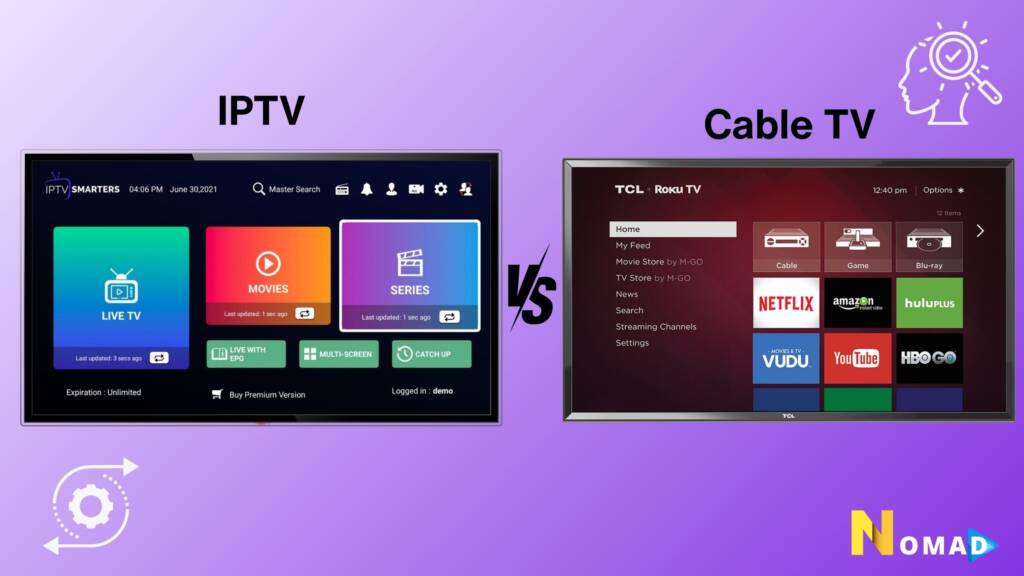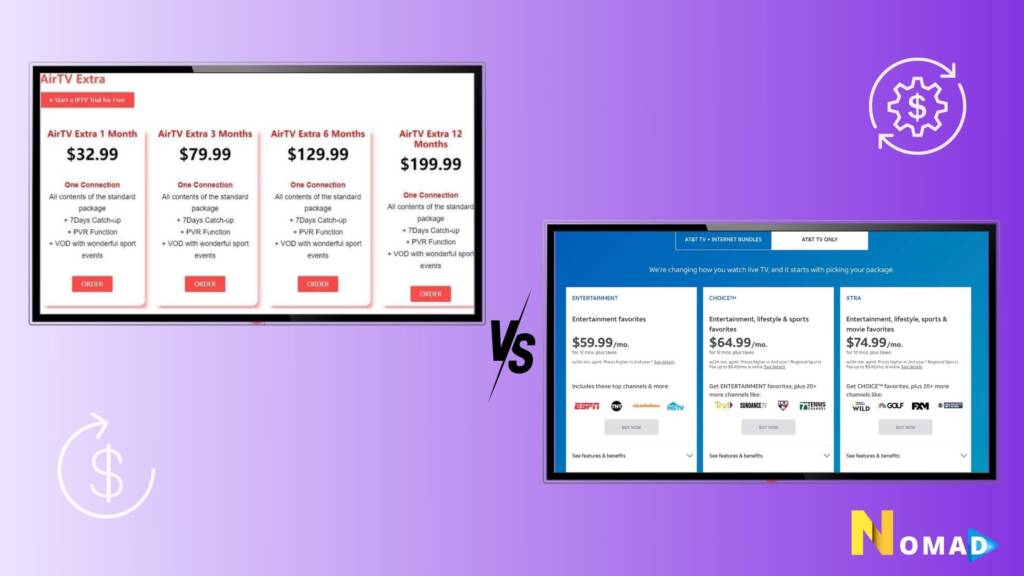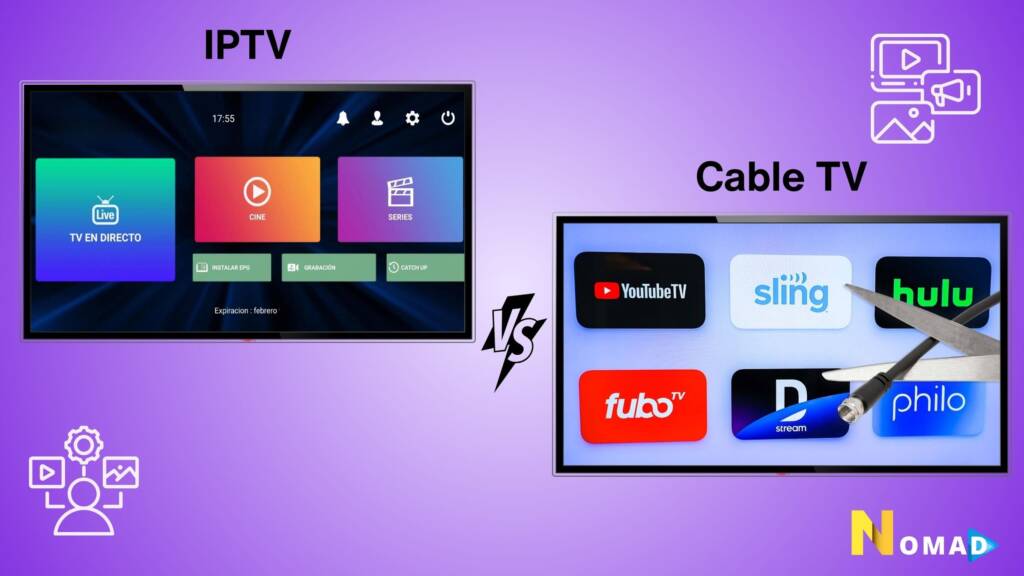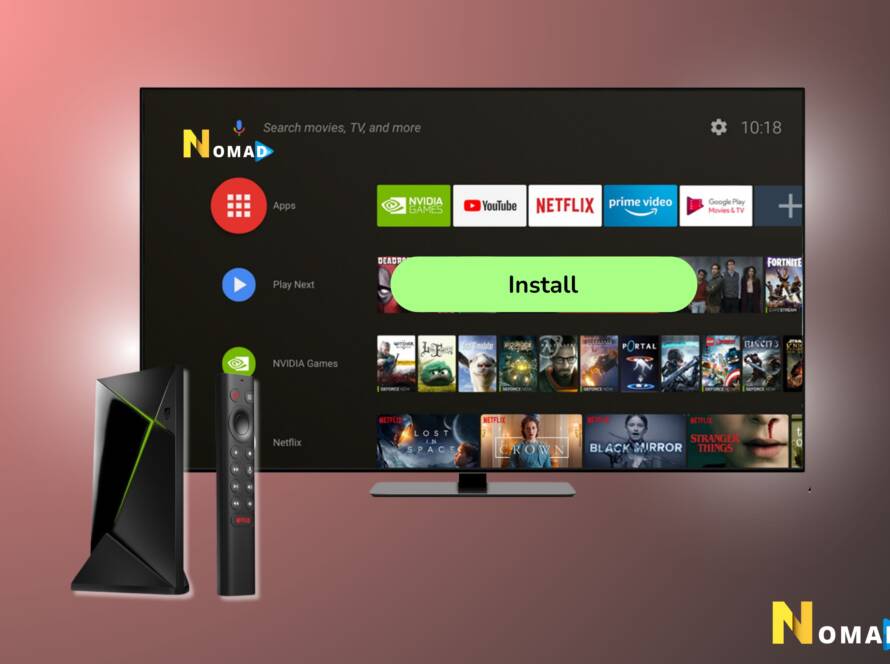IPTV (Internet Protocol Television) and cable TV are two popular ways of consuming television content. While cable TV has been around for decades, IPTV is a relatively new technology that is gaining popularity. In this blog, we will compare IPTV and cable TV and help you determine which is better for you.
Table of Contents
Understanding IPTV and Cable TV

IPTV vs cable TV TV shows are broadcast online via IPTV or Internet Protocol Television. IPTV is an accessible option for on-demand entertainment because it allows customers to view media continuously, unlike older methods. In contrast, cable TV employs a system of digital signals or coaxial wires for the delivery of television content. With its many channels and dependable service, it has been the norm for decades.
Both services provide access to television content, but there are significant differences in their strategies and user interfaces. Comparisons between IPTV and cable TV frequently highlight IPTV’s modernity and ease over cable TV’s well-established dependability. However, what makes them unique, and why is IPTV becoming more and more popular?
Cost Comparison: IPTV vs Cable TV

IPTV vs cable TV When the prices are compared, IPTV usually provides a more affordable option. Subscriptions to traditional cable TV can be pricey, particularly if premium channels and other services are included. On the other hand, IPTV providers frequently offer more affordable price plans, with possibilities for pay-as-you-go or user-customized bundles.
With IPTV, customers can select the channels or bundles they want, so they only pay for what they need and don’t have to pay more for channels they don’t want. For many households, IPTV is a more cost-effective option because of its versatility. In addition, compared to cable TV, IPTV frequently has no long-term agreements or hidden costs, giving users even more financial freedom.
Content Variety and Customization

IPTV vs cable TV The extensive content catalogue and personalization choices of IPTV are among its most notable characteristics. Globally unique material, on-demand videos, and live TV are all available to users. Whether you’re a sports fan, movie fanatic, or documentary lover, there’s something for everyone thanks to this wide selection.
Although it has many more channels than satellite TV, cable TV does not offer as much personalization. Pre-set bundles that contain a large number of channels that subscribers may never see are usually forced upon them. On the other hand, IPTV gives customers the ability to customize their viewing experience by letting them match their subscriptions to their interests. This feature alone frequently sways the [IPTV vs. cable TV] debate in IPTV’s favor.
Viewing Flexibility
IPTV vs cable TV IPTV excels at offering the most viewing flexibility available. Users may watch their favourite episodes and movies on a variety of devices, including computers, tablets, smartphones, and smart TVs, because it runs via the internet. With this multi-device interoperability, you can enjoy entertainment anywhere, at any time.
However, cable TV is typically limited to the television. Although some cable networks have mobile apps, IPTV offers a more fluid and integrated experience than some other providers. IPTV’s pause, rewind, and record features improve the viewing experience and offer a degree of control that cable TV can’t equal.
Quality of Service and Reliability
IPTV vs cable TV While IPTV has made great progress in these areas, cable TV is still known for its dependability and steady service quality. Thanks to improvements in speed and internet technology, IPTV is now able to broadcast high-definition video without lag or buffering. IPTV is becoming a formidable competitor in the [IPTV vs. cable TV] conflict thanks to the development in service quality.
But IPTV does require a steady internet connection, which can be problematic in places with spotty service. Because cable TV is not connected to the internet, it has a reliability advantage, especially in areas where high-speed internet is not easily accessible. Despite this, IPTV is becoming more and more popular due to the expansion of high-speed internet access.
Interactive Features and User Experience
IPTV vs cable TV What differentiates IPTV from standard cable TV is its interactive features. Advanced features like video on demand, interactive guides, and tailored suggestions are frequently seen on IPTV services. These features make it more interesting and intuitive, while also improving the user experience.
Although it offers clear-cut and dependable service, cable TV is devoid of these interactive features. Tech-savvy consumers find IPTV to be a more appealing alternative due to its extensive on-demand selection, capacity to engage with content, and ability to investigate recommendations. The contemporary, interactive experience of IPTV is a key benefit in the [IPTV vs. cable TV] discussion.
Global Access and Content Diversity
IPTV vs cable TV A global reach that cable TV cannot match. International channels and materials are available to users, offering a wide variety of viewing choices. For expats and multicultural households searching for content from their home nations, this worldwide access is especially enticing.
Due to its local focus, cable TV is lacking in diversity. It can be a disadvantage for subscribers who are looking for a wider variety of programming because they are restricted to the channels that are available in their area. IPTV’s capacity to study foreign programs is one of its strongest points.
On-Demand Viewing and Binge-Watching
IPTV vs cable TV The ability to watch IPTV on demand is one of its main benefits. The broadcast schedule is not a constraint on viewers, who can watch their preferred television shows and movies whenever they want. This adaptability encourages binge-watching, a rising practice in which fans watch several episodes or a whole series in one sitting.
With its set programming, cable TV does not accommodate this contemporary watching preference. Although some cable companies do provide on-demand services, IPTV’s offerings are more integrated and have a wider range of features. In the [IPTV vs. cable TV] comparison, IPTV is a more alluring choice due to the flexibility of on-demand viewing.
Conclusion
IPTV vs cable TV When it comes to modern entertainment, IPTV is unquestionably the better option when compared to cable TV. For many households, its superior features, large content collection, price, and flexibility make it the best choice. While IPTV offers a more inventive and user-friendly experience than cable TV, the latter is still a dependable and well-established service.
IPTV’s dominance in the entertainment industry is expected to increase as technology advances and internet access spreads. IPTV offers plenty to offer whether you’re searching for an affordable option, a wide variety of content, or the newest innovations in technology. With IPTV, you can embrace the future of television and take advantage of a personalized viewing experience.
FAQ
Q1: What are the primary distinctions between cable TV and IPTV?
While cable TV offers a more conventional watching experience via digital signals or coaxial cables, IPTV distributes television programs over the internet, providing flexibility and customisation. While cable TV is renowned for its dependability and selection of local channels, IPTV frequently offers interactive features and a wider variety of on-demand programming.
Q2: Is IPTV less expensive than cable television?
Because IPTV offers customizable pricing plans and the option to pay for individual channels or packages, it is typically more economical. Subscriptions to cable TV can get pricey, especially when premium channels and services are charged extra. IPTV is a cost-effective option because it frequently doesn’t have long-term commitments or hidden fees.
Q3: How many devices can I use to stream IPTV?
Yes, IPTV’s interoperability with a wide range of gadgets, such as laptops, tablets, smartphones, and smart TVs, is one of its benefits. This gives consumers unrivaled watching flexibility over cable TV by enabling them to watch their favorite programs and films whenever and wherever they choose.
Q4: How do IPTV and cable TV compare in terms of service quality?
While IPTV has made major advancements in these areas, cable TV is still recognized for its consistently high caliber and dependable services. IPTV can now stream HD video without a lag thanks to developments in internet technology. But IPTV does require a steady internet connection, which can be problematic in places with spotty service.
Q5: What aspects of IPTV are eco-friendly?
Because IPTV uses the internet that already exists, it doesn’t require as much physical infrastructure as cable TV, which requires vast networks of wires and other devices. IPTV is a more environmentally friendly option because of its less impact.

